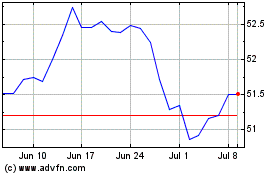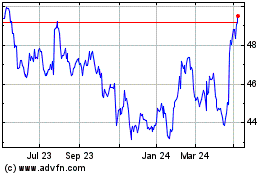Unilever Faces Squeeze in North America -- 2nd Update
January 31 2019 - 8:11AM
Dow Jones News
By Peter Stiff
LONDON -- Unilever PLC reported disappointing quarterly revenue
growth and warned of a tough year ahead amid fierce competition in
North America and volatile emerging markets, underscoring the
challenge facing new Chief Executive Alan Jope.
The maker of Hellmann's mayonnaise and Dove soap, reporting its
first earnings since Mr. Jope took charge, said Thursday its
closely watched underlying sales rose 2.9% in the fourth quarter,
below the 3.5% level expected by analysts.
For 2019, it forecast underlying growth at the lower half of its
long-term guidance of 3% to 5%, citing uncertainty in several
countries. The downbeat tone prompted the company's shares to fall
more than 3%.
"Accelerating quality growth will be my No. 1 priority, we still
have many untapped opportunities," Mr. Jope said on a call with
analysts.
The Unilever veteran, who replaced longtime CEO Paul Polman at
the start of the year, is trying to spur growth while raising the
company's operating margin to 20% by 2020 -- a target set by his
predecessor after fending off a takeover approach from Kraft Heinz
Co. For 2018, the margin rose to 18.4%, with Mr. Jope saying
Unilever was on track to meet its 2020 goals.
A challenging industry backdrop doesn't make the new CEO's task
any easier.
Unilever, like its peers, is grappling with changing consumer
tastes, competition from new brands and volatile emerging markets,
which make up about 60% of the Anglo-Dutch company's revenue. The
industry also faces rising commodity costs and growing competition
from Amazon.com Inc. and discount chains that are launching
own-label products.
In response, Unilever has focused more on higher-margin
personal-care brands, pivoted away from slower-growing food and
pushed into e-commerce with acquisitions such as online
razor-delivery startup Dollar Shave Club.
Over 2018, competition was particularly intense in North
America, where full-year underlying sales growth was 1%, excluding
its recently sold spreads business. The company said categories
such as ice cream, tea and dressings were challenging, with all
growth in the region coming from beauty and personal-care
products.
At its third-quarter update last year, Unilever cheered
investors by saying it had been able to raise list prices. However,
on Thursday the company said pricing gains had been washed away in
the fourth quarter by a higher level of discounting.
One particularly competitive area is mayonnaise, where Unilever
is engaged in a promotional battle with Kraft Heinz.
Unilever said its performance was encouraging in Europe, where a
warm summer boosted sales of its ice cream brands like Magnum. But
this was overshadowed by challenges in struggling economies such as
Argentina, where it sold fewer products amid a bout of
hyperinflation.
Overall, Unilever reported a fall of 5.1% in full-year revenue
to EUR50.98 billion ($58.54 billion), which it attributed to the
sale of its spreads business and currency headwinds. Net profit
jumped to EUR9.39 billion from EUR6.05 billion, boosted by the
sale.
--Carlo Martuscelli contributed to this article.
Write to Peter Stiff at peter.stiff@wsj.com
(END) Dow Jones Newswires
January 31, 2019 07:56 ET (12:56 GMT)
Copyright (c) 2019 Dow Jones & Company, Inc.
Unilever (EU:UNA)
Historical Stock Chart
From Mar 2024 to Apr 2024

Unilever (EU:UNA)
Historical Stock Chart
From Apr 2023 to Apr 2024
